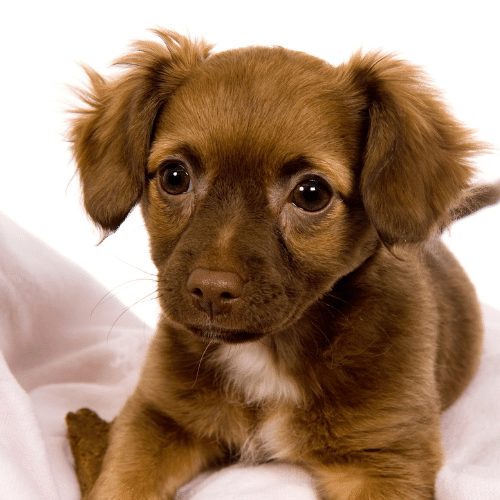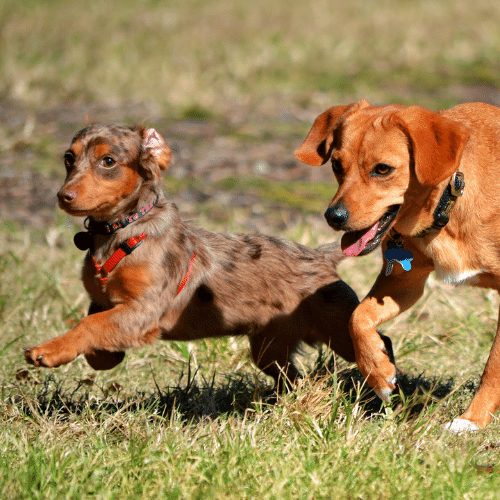Chiweenie Adult Size & Weight Growth Chart & Calculator
February 22, 2021 2022-08-16 17:15So you decided on an adorable Chiweenie puppy. These Dachshund-Chihuahua crosses are highly popular these days. They are perfect dogs for first-time owners or city dwellers, because they stay very small! But how big do Chiweenies get? What adult size can you expect?
Simply enter your puppy’s weight and age below and find out!
Chiweenie Weight Calculator & Growth Chart
Table of Contents

How big will my Chiweenie get?
Your Chiweenie puppy’s adult weight and size will depend on his parents’ size. Most Chiweenies grow up to be between 6-10 inches tall and 5-12 pounds light, with Teacup Chihuahuas being even smaller.
Chiweenies are crosses between Chihuahuas and Dachshunds. While both of these breeds are small, some breeders have strived to produce extra tiny dogs from them.
A Standard Dachshund stands at 8-9 inches tall, a Mini Dachshund can be as tiny as 5-6 inches in height! The Standard Dachshund’s weight is about 16-32 pounds while a Mini may be as light as 7-11 pounds.
If your Chiweenie is the cross between a small Chihuahua and a Mini Dachshund, he might be as tiny as just 4 pounds full-grown! On the other side, if your Chiweenie’s parents were a tall Chihuahua and a Standard Dachshund, he might be over 14 pounds.

When is a Chiweenie full-grown?
As a small dog breed, Chiweenies reach their adult size early on in life. Most of them will be close to full-grown by the time they are 8-10 months old. After this age, they will continue to “fill out” – that means that their chest gets broader and they gain muscle mass. However, these changes will be minor and not have a big impact on your Chiweenie’s weight.
If your Chiweenie has a short coat, he will have his adult fur by the time he is 4-6 months old. If he has a long coat it will continue growing and reach its final length and looks by around 10 months.
Should you choose to not spay your female Chiweenie, she will likely stop growing after her first heat cycle. As a small dog, this might be rather early, at about 6-10 months of age. If you choose to spay or neuter your puppy earlier, he or she will actually continue to grow taller. This difference is not big though – it should not change your Chiweenie’s full-grown size by more than 1/2 inch.
Factors influencing growth
Your puppy’s growth can be influenced by a number of different factors. The most important one is genetics. Others can contribute to your puppy’s final size as well, including:
- Time of spay or neuter surgery
Dogs that are altered early in life tend to grow taller, as they are lacking the hormone that closes the growth plates. - Nutrition
If you do not provide adequate nutrition for your dog, he will experience stunted growth. You should always strive to feed your dog a high-quality and balanced diet. Do not attempt to cook your dog’s food at home – this is not a good idea and quickly results in malnutrition if you do it incorrectly. - Parasites
If your Chiweenie suffers from intestinal parasites such as Giardia, he will lack nutrients and show a stunted growth. You should have your puppy evaluated by a veterinarian as soon as possible if you suspect he suffers from parasites. The good news is that he will quickly catch up on his growth curve as soon as the infestation is treated.
How much should a Chiweenie weigh?
The ideal weight of your Chiweenie will depend on his height and body built. For most dogs of this breed, the ideal weight lies between 5 and 12 pounds. Of course, you should absolutely avoid having your Chiweenie become overweight or obese.
Unfortunately, a lot of pet dogs tend to be too heavy once they have passed their puppy stage. All puppies are wiggly and always in motion, but once your Chiweenie is 2-3 years old and settles down, you need to watch his weight closely. An overweight Chiweenie will be more prone to developing diabetes, suffering from joint problems or developing back pain.
In order to assess your Chiweenie’s weight, run your fingers across his rib cage. Can you easily feel his ribs without pushing in? If so – great! He has an ideal weight. If you feel a layer of fat above the ribs or cannot feel the ribs at all, your Chiweenie needs a diet.
Again: Weighing too much is a serious problem and will lead to health conditions down the line. As small dogs, Chiweenies do not need a lot of food once they are finished growing.
When you check your dog’s food for feeding instructions, be wary: Many dog food manufactures actually recommend feeding too much of their food. (Because it makes owners, well, buy more of it)
Should your dog’s ribs be covered by a layer of fat, it is really time to feed less. Keeping your Chiweenie lean and at a healthy weight is the best step you can take towards guaranteeing a long and healthy life for him.

